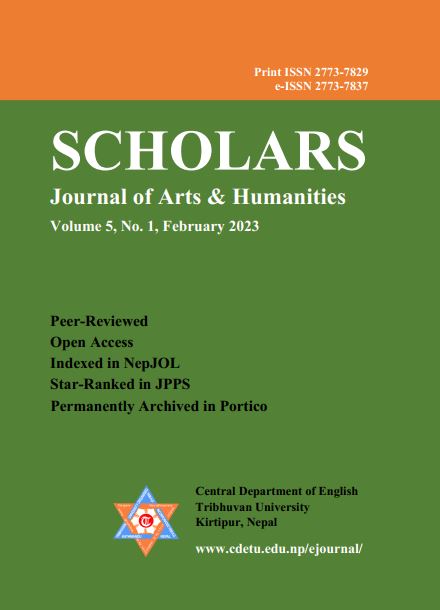Limbu Poetry as Ekphrastic Poetry: Representing Indigenous Identities
DOI:
https://doi.org/10.3126/sjah.v5i1.52475Keywords:
Ekphrasis, body, culture, Mundhum, identity, dissidenceAbstract
The Limbu poets Prakash Thamsuhang, Upendra Subba, Ranjana Limbu, Sundar Kurup and Man Prasad Subba display their indigenous identities through their ekphrastic poetry. They capture visual dimensions of Limbu body conveying distinctive poetic experimentation from the margin, making a rupture with the mainstream literary trends and modes. At the back of their poetic rhetoric lies the pulsating rhythm of cultural psychology and the praxis of distinct Limbu indigenous identity. In doing so, the poets invite a critical approach to discover the significance of Limbu’s psycho-cultural indigeneity. In this backdrop, this paper assesses internalized cultural psychology forming Limbu identity in the poems. It also scrutinizes poet’s indigenous aesthetics and cultural politics of identity expressed in a visual body form. Supplemented by the insights on the major aspects of Limbu culture, ethnicity, identity and marginality, I have approached the poems from the theoretical lens of Cultural Psychology, which considers a work of art as the representation of embeddedness between culture and psychology. The paper claims that the cultural politics underlying poetic works centering upon the Limbu indigenous principle, has an undertone of the valorization of voice from the margin. The psycho-cultural underpinnings on which the rhetoric of ekphrasis draw are attributable to the marginal discourse of renunciation and resistance against dominant power bloc.
Downloads
Downloads
Published
How to Cite
Issue
Section
License

This work is licensed under a Creative Commons Attribution 4.0 International License.
© Central Department of English, Tribhuvan University and Authors




